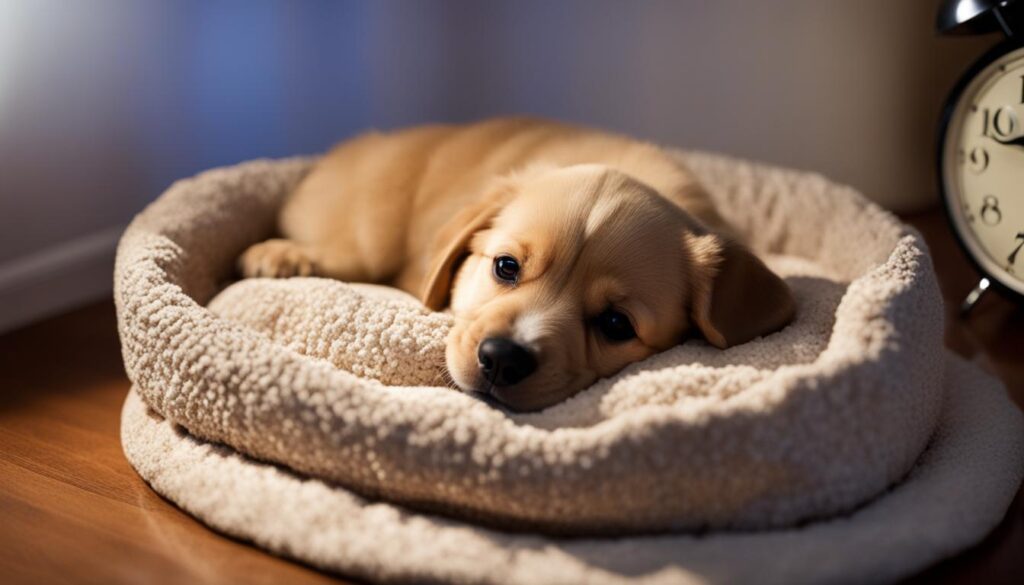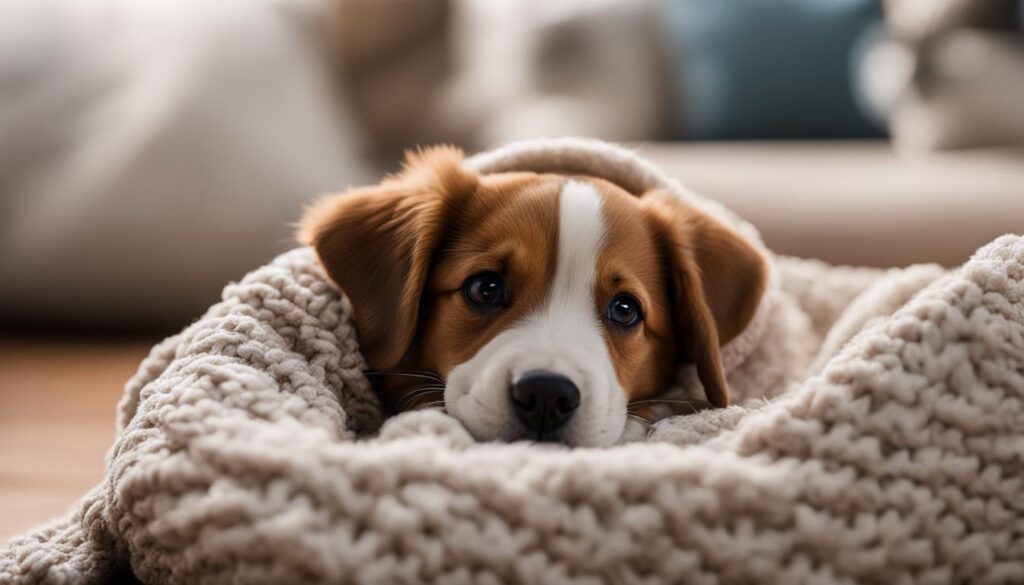
Deciphering Your Puppy’s Sleep Schedule: How Much Sleep Do Puppies Need?
As a puppy owner, it’s essential to understand the sleep needs of your furry friend. Puppies require a significant amount of sleep for their healthy growth and development. But how much sleep do they need?
Puppies typically sleep 18 to 20 hours a day, which might seem like a lot. However, this extensive sleep period is crucial for their overall well-being. During this time, puppies’ bodies and minds are rigid at work. Adequate sleep supports the development of the central nervous system, brain, immune system, and muscles.
Understanding your puppy’s sleep schedule is vital for ensuring they get the rest they need. By deciphering their sleep patterns and creating a healthy sleep routine, you can promote their growth and create a harmonious environment for both of you.
Key Takeaways:
· Puppies require 18 to 20 hours of sleep daily for healthy growth.
· Adequate sleep supports the development of the central nervous system, brain, immune system, and muscles.
· Understanding your puppy’s sleep patterns is crucial for providing them with the rest they need.
· Creating a healthy sleep routine promotes a harmonious environment for you and your puppy.
· By deciphering your puppy’s sleep schedule, you can ensure their growth and overall well-being.
Why Do Puppies Sleep So Much?
Puppies are notorious for their excessive sleeping habits, often spending the majority of their day napping away. But have you ever wondered why puppies sleep so much? In this section, we’ll explore the fascinating world of puppy sleep patterns, the role of REM sleep in their development, and how much sleep is enough for your growing furry friend.
Understanding Puppy Sleep Patterns
Before we delve into why puppies sleep so much, let’s closely examine their sleep patterns. Puppies have irregular sleep cycles that consist of alternating periods of deep sleep and REM (rapid eye movement) sleep, just like grown up dogs. However, puppies spend more time in REM sleep than grown up dogs, which is believed to be crucial for their physical and mental development.
The Role of REM Sleep in Puppy Development
REM sleep plays a vital role in puppy development. Their brains are highly active during this sleep stage, and dreams may occur. This is when essential processes such as memory consolidation, learning, and emotional regulation occur. By spending more time in REM sleep, puppies can support their cognitive and emotional function, enabling them to grow and learn rapidly.

How Much Sleep is Enough for Your Growing Puppy?
A growing puppy’s sleep varies depending on age and activity level. Newborn puppies, for example, require almost constant sleep as they are still developing and growing. As they reach the age of 3 to 4 months, they start to establish a more regular sleep schedule, typically sleeping for 18 to 20 hours a day.
It’s important to note that puppies also have bursts of energy and need playtime to burn off their excess energy. These active periods should be balanced with sufficient restful sleep. As puppies mature, their sleep needs gradually decrease, but they still require more sleep than grown up dogs. Ensuring your growing puppy gets enough sleep is essential for their overall health, well-being, and development.
Creating a Healthy Puppy Sleep Schedule
Establishing a sleep routine for your new puppy is essential for ensuring they get the sleep they need. Puppies, just like human babies, thrive on consistency and structure. By implementing a regular sleep schedule, you can help your puppy develop healthy sleep habits that will benefit their growth and overall well-being.
Establishing a Sleep Routine for Your New Puppy
When bringing a new puppy home, it’s essential to establish a sleep routine from the beginning. This means setting specific times for your puppy to go to bed and wake up. Consistency is critical, so stick to the same schedule daily.
Creating a bedtime routine can also help signal your puppy that it’s time to sleep. This can include calming walks anytime and quiet time before bed. Avoid high-energy play or stimulating activities close to bedtime, as this can make it harder for your puppy to settle down.
Ensuring Your Puppy Gets the Sleep They Need
Puppies need a significant amount of sleep to support their growth and development. A puppy can sleep anywhere from 18 to 20 hours a day. It’s essential to ensure that your puppy has the opportunity to get this much-needed rest.
During the day, provide your puppy with a quiet and comfortable space where they can take naps. This can be a crate, a designated bed, or a cozy corner in your home. Create a sleeping space for your puppy that is undisturbed, safe, and secure.
The Importance of a Sleep Area in Sleep Habits

A designated sleep area for your puppy is crucial for developing healthy sleep habits. This area should be separate from their play and eating areas, distinguishing between rest and activity.
A comfortable dog bed or crate with soft bedding can provide the perfect sleep environment for your puppy. Make sure the area is cozy, quiet, and well-ventilated. Consider placing a familiar blanket or toy in the sleeping area to provide your puppy comfort and security.
By creating a healthy puppy sleep schedule, establishing a sleep routine, and providing a designated sleep area, you can ensure your puppy gets the sleep they need for optimal growth and development.
Common Issues with Puppy Sleep
Puppies are adorable and full of energy, but sometimes, they can have trouble with their sleep. It’s common for puppy owners to encounter issues with their furry friends, such as not getting enough sleep or waking up frequently at night. Understanding and addressing these common issues is essential for ensuring your puppy gets the rest they needs for optimal health and well-being.
Why Your Puppy May Not Be Getting Enough Sleep
There could be several reasons why your puppy is not getting enough sleep. Some common factors include:
· Stress or anxiety: Puppies may have difficulty sleeping if they are feeling stressed or anxious. New environments, changes in routine, or unfamiliar noises can all contribute to their restlessness.
· Physical discomfort: Issues such as teething, digestive problems, or discomfort from an improper sleeping surface can disrupt a puppy’s sleep.
· Lack of exercise: Puppies have plenty of energy to burn, and a lack of physical activity during the day can lead to restlessness at night.
Identifying the specific reason behind your puppy’s sleep issues can help you address the underlying cause and provide appropriate solutions.
How to Deal with a Puppy Waking Up At Night
If your puppy wakes up at night, it’s essential to approach the situation patiently and consistently. Here are a few strategies to help manage this common issue:
1. Create a comfortable sleep environment: Ensure your puppy’s sleep area is cozy, quiet, and distractions less. Consider using a crate or designated sleeping space to create a sense of security.
2. Establish a bedtime routine: Implement a consistent nighttime routine that includes calming activities such as gentle play, a relaxing massage, or a quiet walk before bed. This routine can signal your puppy that it’s time to wind down and sleep.
3. Avoid rewarding attention-seeking behavior: If your puppy wakes up and starts whining or barking for attention, resist the urge to respond immediately. While addressing their needs is essential, giving in to attention-seeking behavior can reinforce the habit of waking up at night.
4. Gradual adjustment of sleep schedule: If your puppy has developed an irregular sleep schedule, gradually adjust their bedtime and waking time to encourage them to sleep through the night. This process may take some time and consistency to establish.
By implementing these strategies, you can help your puppy develop healthy sleep habits and reduce their tendency to wake up frequently during the night.
Adjusting Your Puppy’s Sleep Schedule
If your puppy is consistently not getting enough sleep, it may be necessary to adjust their sleep schedule. Consider the following factors:
· Age: Puppies have different sleep needs at various stages of their development. Younger puppies may require more sleep, while older puppies may be more active during the day and need fewer naps.
· Activity level: Puppies with higher activity levels may need more frequent naps to rest and recharge throughout the day.
· Health and well-being: If your puppy is not feeling well or has any underlying health issues, it’s essential to consult with a veterinarian to ensure their sleep schedule aligns with their overall health needs.
Adjusting your puppy’s sleep schedule based on their age, activity level, and overall health can help them get the rest they need to grow, learn, and thrive.
Training Your Puppy to Sleep Through the Night
Training a puppy to sleep through the night can be challenging, but with practical tips and techniques, creating a peaceful and restful sleep routine is possible.
Practical Tips to Help Your Puppy Sleep at Night
To ensure your puppy gets a good night’s sleep, consider implementing the following tips:
- Create a consistent bedtime routine: Establish a regular schedule for feeding, exercise, and bathroom breaks. This will help your puppy understand when to wind down and sleep.
- Provide a comfortable sleep area: Make sure your puppy has a cozy bed or crate that is clean, quiet, and distraction less. This will create a sleep-friendly environment.
- Encourage exercise during the day: Engage your puppy in physical activities and playtime to help them burn off excess energy. This can promote better sleep quality at night.
- Limit food and water intake before bed: Avoid feeding your puppy a large meal or providing access to water right before bedtime. This can help prevent bathroom breaks during the night.
- Use soothing sounds or white noise: Playing soft, calming music or using a white noise machine can help drown out external noises and create a relaxing ambiance for your puppy’s sleep.
From Puppy Sleep to Getting a Better Night’s Sleep: A Step-by-Step Guide
Follow this step-by-step guide to help your puppy transition from restless nights to a better night’s sleep:
- Establish a consistent routine: Set a regular bedtime and wake-up time to create a predictable sleep schedule for your puppy.
- Create a peaceful sleep environment: Provide a designated sleep area that is comfortable, quiet, and separate from where your puppy plays or eats.
- Implement a wind-down routine: Develop a calming routine before bedtime, such as a short walk, gentle grooming, or quiet playtime.
- Practice positive reinforcement: Reward your puppy for settling down calmly and staying quiet in their sleep area.
- Be patient and consistent: It may take time for your puppy to adjust to the new sleep routine. Stay consistent with the training and be patient, providing reassurance.
Why Puppies Sleep Through the Night, and Others Don’t
Every puppy is unique; some may naturally sleep through the night, while others may struggle. Several factors can influence a puppy’s ability to sleep through the night:
- Age: Younger puppies have smaller bladders and may need more frequent bathroom breaks, making it harder for them to sleep through the night.
- Breed: Some breeds are more prone to separation anxiety, which can manifest as restlessness at night.
- Health and comfort: If your puppy is experiencing discomfort, such as teething or an upset stomach, they may struggle to sleep through the night.
- Training consistency: Inconsistent or insufficient training can contribute to sleep disruptions.
By understanding these factors and addressing any underlying issues, you can help your puppy develop healthy sleep habits and improve their ability to sleep through the night.
How Long Do Puppies Sleep During the Day vs. Night?
Understanding the differences between puppies’ sleep needs during the day and night is crucial for establishing a balanced sleep schedule. Puppies have unique sleep patterns influenced by their age and daily activities. Let’s explore how their sleep needs differ and how you can help them get the rest they need.
Daytime vs. Nighttime Sleep Needs in Puppies
Puppies, like humans, have different sleep needs during the day and night. During the day, puppies tend to have shorter and more frequent naps. They may take several short naps, totaling around 5 to 6 hours of sleep. This is because puppies have bursts of energy and are often engaged in play and exploration during their wakeful periods.
On the other hand, puppies require more extended periods of uninterrupted sleep at night. They generally sleep 8 to 10 hours at night, allowing for proper rest and recovery. It’s essential to provide them with a quiet and comfortable sleep environment during their nighttime.
Adjusting Daytime Naps to Promote Better Sleep at Night
To help your puppy sleep better at night, it’s essential to adjust their daytime naps. Encourage shorter naps during the day to prevent them from getting too well-rested, which could lead to excessive energy and difficulty settling down at night. Engage your puppy in moderate physical activity and mental stimulation during their wakeful periods to tire them out, making it easier for them to fall asleep at night.
Creating a consistent daytime routine by providing meals, playtime, and naps at regular intervals can also help regulate your puppy’s sleep-wake cycle. Consistency and structure contribute to better sleep habits and overall well-being.
The Impact of Daily Activities on Your Puppy’s Night’s Sleep
Daily activities can significantly impact your puppy’s sleep. Close to bedtime, engaging in stimulating activities, such as intense play sessions or training, may make it difficult for them to wind down and fall asleep. Similarly, feeding them a large meal or providing excessive water intake right before bedtime can disrupt their sleep by causing the need for frequent bathroom breaks.
To ensure quality rest at night, providing your puppy with a calm and relaxing environment in the hours leading up to bedtime is essential. To promote relaxation, engage in calming activities such as gentle play, cuddling, or a short walk. Limiting access to stimulating stimuli, such as bright lights and loud noises, can also help create a sleep-friendly environment.
| Daytime Sleep Needs | Nighttime Sleep Needs |
| Short and frequent naps totaling 5-6 hours | Longer periods of uninterrupted sleep for 8-10 hours |
Ensuring Your Puppy Is Getting Healthy Sleep
Ensuring that your puppy gets healthy sleep is essential for their overall well-being. Adequate sleep is crucial for their growth, development, and overall health. By recognizing the signs of sufficient sleep in puppies and understanding the impact of a lack of sleep on their behavior and development, you can ensure your puppy’s well-being and promote healthy sleep habits.
Recognizing the Signs Your Puppy is Getting Enough Sleep
Recognizing the signs indicates your puppy is getting enough sleep is essential. Keep an eye out for the following behaviors:
- Regular sleep patterns: Puppies have a consistent sleep routine, taking frequent daily naps. They may have shorter bursts of playful energy followed by more extended periods of sleep.
- Calming down quickly: If your puppy can relax and settle down quickly, it may indicate they are well-rested and getting sufficient sleep.
- Healthy appetite: Puppies getting enough sleep tend to have a healthy appetite. They will eagerly eat their meals and have an excellent overall daily appetite.
- Alert and focused: Well-rested puppies are more alert, responsive, and able to concentrate on learning and training activities.
If you observe these signs in your puppy, they are likely getting enough sleep to support their growth and development.
How Lack of Sleep Affects Puppy Behavior and Development
The impact of a lack of sleep on puppy behavior and development can be significant. If your puppy is not getting enough sleep, they may exhibit the following behaviors:
- Excessive hyperactivity: Sleep-deprived puppies may be overly active, restless, and have difficulty settling down.
- Irritability: Lack of sleep can make puppies more irritable and prone to mood swings.
- Poor focus and learning ability: Puppies who lack sufficient sleep may struggle with focus, attention, and learning new commands or behaviors.
- Delayed growth and development: Sleep is essential for a puppy’s growth and development. A lack of sleep can hinder their overall physical and cognitive development.
It is essential to address any sleep issues promptly to ensure your puppy’s well-being and promote healthy behavior and development.
Making Sure Your Puppy’s Sleep Environment Promotes Healthy Sleep
Creating a sleep environment that promotes healthy sleep is critical to ensuring your puppy gets the rest they need. Consider the following tips:
- Comfortable bedding: Provide a comfortable and cozy bed for your puppy. Choose a bedding material that is soft and supportive.
- Quiet and dark environment: Minimize noise and light in your puppy’s sleep area to create a calm and relaxing atmosphere.
- Temperature control: Ensure that the room or area where your puppy sleeps is at a comfortable temperature. Avoid extreme heat or cold that may disrupt their sleep.
- Consistent sleep routine: Establish a regular sleep routine for your puppy. Stick to a consistent bedtime and waking-up times to help regulate their internal sleep-wake cycle.
By taking these steps, you can create a sleep environment that promotes healthy sleep and supports your puppy’s overall well-being.
Conclusion
In conclusion, understanding and managing your puppy’s sleep schedule is crucial for their growth, development, and overall well-being. Puppies require a significant amount of sleep for healthy growth, typically sleeping for 18 to 20 hours a day. Adequate sleep is essential for developing the central nervous, brain, immune, and muscles. Lack of sleep can lead to behavioral issues and hinder their overall health.
Establishing a healthy sleep routine is essential to ensure your puppy gets sleep. Consistency is vital; it helps puppies understand when to rest. Set a regular bedtime and create a calming pre-sleep routine to signal sleep time to your furry friend. Providing them with a designated sleep area, such as a cozy crate or a comfortable bed, gives them a safe and comfy space to sleep.
It’s also important to address common issues affecting your puppy’s sleep. If your puppy is not getting enough sleep or waking up frequently at night, identify the underlying reasons and implement strategies to address them. Adjusting their sleep schedule or addressing any discomfort they may be experiencing can improve their sleep quality.
By understanding the importance of puppy sleep and implementing these tips for managing their sleep schedule, you can ensure your puppy gets the rest they need for a happy and healthy life. Creating an environment that promotes healthy sleep and addressing any issues will contribute to their overall well-being and strengthen the bond between you and your furry companion.
FAQs
Q: How much sleep do puppies need?
A: Young puppies need much sleep to grow and develop properly. On average, they may need to sleep up to 20 hours in 24 hours during their first few weeks of life. As puppies get older, the amount of sleep required gradually decreases but remains substantial for their well-being.
Q: How much do puppies sleep throughout their early stages?
A: In the early stages, much of a puppy’s sleep can vary slightly depending on the breed and individual energy levels. However, it’s common for puppies to sleep anywhere from 18 to 20 hours a day. This sleep is crucial for their mental and physical development.
Q: How can I help get my puppy to sleep through the night?
A: To help get your puppy to sleep through the night, establish a consistent bedtime routine that may include a calm period of play, a final bathroom break, and a quiet, comfortable sleeping area. Keeping your puppy active during the day will also help them to be more tired at bedtime.
Q: When should I be concerned about my puppy’s sleep pattern?
A: Concerns regarding your puppy’s sleep pattern should arise if you notice extreme deviations from typical sleep durations for their age, such as if your puppy sleeps less than expected or shows signs of difficulty sleeping. Consulting a veterinarian can help address any underlying health issues.
Q: How can I keep my puppy from sleeping too much during the day?
A: To keep your puppy from sleeping too much during the day, engage them with regular playtime, training, and walks. This stimulates their mind and body and helps regulate their sleep pattern, ensuring they’re more likely to sleep at night.
Q: Does my puppy’s breed influence how much it will sleep?
A: Yes, your puppy’s breed can influence how much it will sleep. Larger breeds tend to need more sleep than smaller breeds, although there are exceptions. Knowing the specific needs of your puppy’s breed can help you set appropriate expectations for their sleep patterns.
Q: How does the sleeping pattern of a puppy change as it grows?
A: As puppies grow older, their sleeping patterns change. Initially, puppies sleep up to 20 hours per day, but as they grow, they sleep less. Grown up dogs sleep an average of 12-14 hours per day. It’s normal for puppies to gradually adjust to a sleep pattern more akin to grown up dogs as they mature.
Q: What are some effective strategies to get your puppy to sleep on schedule?
A: Effective strategies to get your puppy to sleep on the schedule include establishing a consistent bedtime routine, creating a comfortable and quiet sleeping environment, and ensuring they have adequate exercise during the day. Also, try to take your puppy out for a bathroom break just before bedtime to avoid nighttime disruptions.

